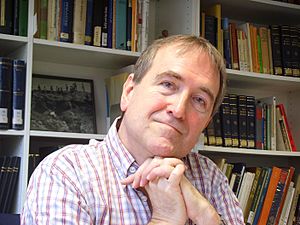Chris Stringer facts for kids
Quick facts for kids
Chris Stringer
|
|
|---|---|

Stringer in 2012
|
|
| Born |
London, United Kingdom
|
| Alma mater | University College London Bristol University |
| Scientific career | |
| Institutions | Natural History Museum, London |
| Thesis | A multivariate study of cranial variation in middle and upper Pleistocene human populations (1974) |
| Doctoral advisor | Jonathan H. Musgrave |
Christopher Brian Stringer is a British scientist who studies human evolution. He is known for his important work on how modern humans developed and spread across the world.
Contents
About Chris Stringer
Early Life and Education
Chris Stringer grew up in London, England. He became interested in anthropology, which is the study of humans, when he was in primary school. He even did a project about Neanderthals!
He went on to study anthropology at University College London. Later, he earned his PhD and DSc degrees from Bristol University. These degrees are about the study of the human body and how it changes over time.
Working at the Museum
In 1973, Chris Stringer started working at the Natural History Museum, London. This is a very famous museum where scientists study nature and history. Today, he is a top researcher there, focusing on where humans came from.
Understanding Human Origins
The "Out of Africa" Idea
Chris Stringer is well-known for his work on the "Out of Africa" theory. This idea suggests that all modern humans first appeared in Africa. This happened more than 100,000 years ago.
According to this theory, these early modern humans then moved out of Africa. They spread to other parts of the world between 50,000 and 100,000 years ago. As they spread, they replaced older human groups, like Neanderthals.
At first, scientists thought there was little mixing between these groups. However, newer studies of DNA show that some mixing did happen. This means modern humans sometimes had children with other ancient human groups.
Newer Ideas About Africa
In recent years, Chris Stringer has suggested a more detailed idea about human origins in Africa. He calls it "multiregional African origin." This idea suggests that modern humans developed in different parts of Africa at the same time. These groups then mixed and shared genes, leading to the humans we see today.
Studying Ancient Britain
Chris Stringer also led a big project called the Ancient Human Occupation of Britain. This project lasted about 10 years, starting in 2001. Scientists worked together to understand when and how humans lived in Britain during the Pleistocene period. The Pleistocene was a time of many ice ages.
He is now helping with a new project called "Pathways to Ancient Britain." This project continues to explore how ancient humans settled in Britain.
Awards and Recognition
Chris Stringer has received many important awards for his work. He is a Fellow of the Royal Society, which is a very old and respected group of scientists. He is also an Honorary Fellow of the Society of Antiquaries of London.
In 2004, he won the Rivers Memorial Medal. In 2008, he received the Frink Medal from the Zoological Society of London. These awards recognize his important contributions to science.
In 2019, he became a member of the American Philosophical Society. This is another highly respected group. In 2023, he was given the title of Commander of the Order of the British Empire (CBE). This honor was for his great work in helping us understand human evolution.
See also
 | Ernest Everett Just |
 | Mary Jackson |
 | Emmett Chappelle |
 | Marie Maynard Daly |

